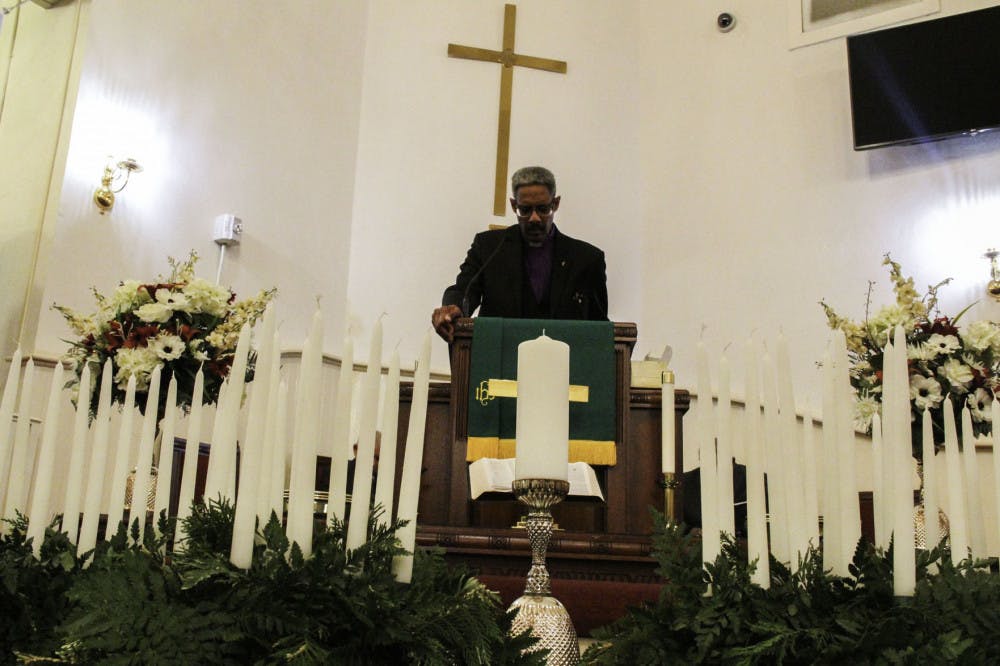Editor’s note: This story contains mention of racial violence.
In 1916, resisting arrest and being related to the friend of a fugitive while Black was a crime punishable by death. That’s what happened to Jim Dennis and his siblings.
When George Wynne tried to issue a warrant for the arrest of Boisey Long, a Black man accused of stealing pigs, Long shot Wynne and then escaped into the night. An angry mob of about 200 mostly white Newberry residents formed to search for Long. They captured him two nights later, but others were caught in the crossfire during their rampage.
Jim Dennis, Long’s friend, was shot and killed in his home for resisting arrest after being suspected of helping Long escape. Dennis’s siblings, Bert and Mary, were rounded up by the same mob and then hanged on an oak tree at the intersection of Newberry Lane and Alachua County Route 235.
With global Black Lives Matter protests in response to police brutality and the continued prevalence of white supremacy, 2020 was a reminder of how the fight for racial equity persists today. Some argue lynchings never stopped, citing incidents such as the killings of Ahmaud Arbery and George Floyd and what some continue to call lynch mobs.
Since June 2018, County Commission Chair Charles Chestnut has led a county-wide effort to recall Alachua County’s legacy of racial violence with Truth and Reconciliation. Heading into the first few months of 2021, Alachua County is prepared to continue hosting commemorative events to remember victims and continue to reconcile with stories like Jim Dennis’.
The commission initiated its endeavor in response to national Equal Justice Initiative lynching research. Local historians were able to confirm a national list of victims and find more. Eleven lynchings happened in Gainesville, according to the county’s timeline.
Jim Dennis’ great-grandson Warren Lee lives to tell his family’s story. He shared what happened on Nov. 15 at Heartwood Soundstage in Gainesville. The Remembrance, Reckoning and Reflection event featured others who spoke on the state of racial equity in the county.
“The tree is gone,” Lee said during the event. “But the memories still linger in the city of Newberry.”
While stories like the Dennises’ are known, historians are unsure of details surrounding other cases. Between 1867 and 1942, at least 50 Alachua County residents were murdered at the hands of prejudicial lynchings, which is defined as an unlawful murder by a group, sometimes even referring to public executions meant as a punishment.
Some victims still remain nameless. Most of them were Black, but some were white and at least one was Jewish.
Newberry leading the way
Among the 50 lynching victims in Alachua County were the Newberry Six – the Black residents who were murdered following the accusation of stolen pigs, including Dennis and his relatives.
Lee, a longtime Newberry resident, said he’s still baffled that his relatives were murdered over pigs. He said he still has a hard time returning to the site of their deaths.
“I cannot imagine seeing their bodies flowing back and forth in the wind of the tree,” Lee said on the Heartwood Soundstage. “I can only think: Was it hot that day? Was it cold that day? Did the Florida buzzards peck at their skin?”
Often lynchings, along with other accounts of white supremacy, are poorly documented and hard to uncover, according to a 2020 New York Times report. With time, more accounts of lynchings have come to the forefront, like the 2017 county report that increased the number of known Alachua County lynchings from 21 to 43. More are likely to be found.
Newberry Mayor Jordan Marlowe represents the town in the Community Remembrance effort. It’s difficult to have accurate records of lynchings because people, generally, can be unwilling to participate in uncomfortable conversations, he said.
He said Newberry has never tried to hide its history of racial violence.
Marlowe and local organizers believe more people may have been killed the day of the Newberry Six lynchings, so they continue to honor the unknown, Marlowe said. After organizing honorary gatherings, he said the town received positive feedback from residents.
Marlowe said he sees police brutality as a modern-day iteration of racial violence such as the Newberry lynchings.
“Think of the Newberry Six in 1916 and then of Ahmaud Arbery in 2020,” he said. “You tell me if these stories seem similar or not.”
Despite Newberry’s efforts, Marlowe said some other towns in the county, such as Hawthorne and Gainesville, have decided to ignore it by not actively looking for more victims. The reason the Newberry Six is so well-known is because of the town’s dedication to search for and publicize the truth, he added.
“As long as there's a city left in the county that’s not acknowledging our work, then I will take the position that we're at the beginning of this process,” he said. “We need to see the truth before we can even really consider reconciliation.”
Micanopy just getting started
In Micanopy, Truth and Reconciliation is still a new conversation.
Jiana Williams, a 34-year-old Micanopy resident, never could have imagined that a lynching took place in the same town square where her grandmother used to spend her days working at a mill.
Local historians are just beginning to uncover the lynchings that happened in Micanopy, Williams said. After learning the history, she said she thinks about her grandmother.
“Knowing that she worked in a town where her ancestors could have been lynched,” she said. “It breaks my heart because it makes it tangible.”
Williams joined the Community Remembrance effort just over a month ago. She felt the need to participate in the group effort because she said being Black in America is still challenging today, racial violence has just taken new forms.
“I can't be in the park bird-watching without a white woman calling the cops,” she said.
Williams said she was the only Black teacher at Micanopy Middle School, a town where just over 8% of the population is Black. She said she was the only Black person some of her students regularly interacted with, which she felt added pressure to make those interactions positive.
The approach of remembrance efforts should aim to bring white people into the conversation, Williams said.
“Twenty years from now, we're going to have the same problem because it's just getting passed down,” she said. “But these scars are still relevant to the descendants of victims.”
Warren Lee said he wishes Alachua County would teach the history of lynchings in classrooms.
“Not one book will tell you about this incident,” Lee said. “But when you talk to the citizens of Newberry, they want to talk about it. And I think we should.”
He sometimes pictures what his relatives' final prayer might have sounded like, he said. As his relatives each sat on a horse with a noose around their neck attached to the tree, he said he believes they might have thought of this Bible passage: “Though I walk through the valley of the shadow of death, I will fear no evil: for thou art with me.”
“Did they get to say a final prayer?” he said. “I don’t know, but I know it wasn’t justice.”
Contact Alan Halaly at ahalaly@alligator.org. Follow him on Twitter @AlanHalaly.

Alan Halaly is a third-year journalism major and the Spring 2023 Editor-in-Chief of The Alligator. He's previously served as Engagement Managing Editor, Metro Editor and Photo Editor. Alan has also held internships with the Miami New Times and The Daily Beast, and spent his first two semesters in college on The Alligator’s Metro desk covering city and county affairs.






